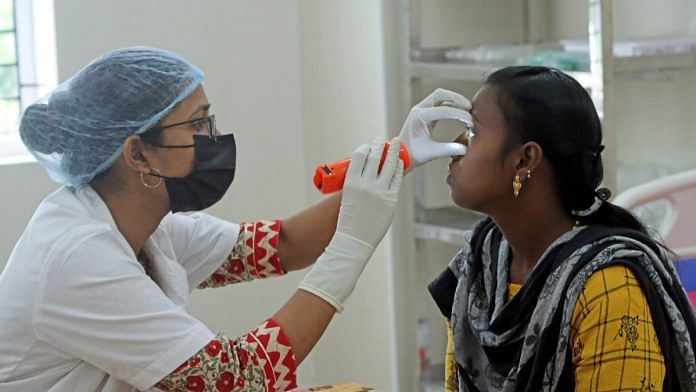New Delhi: A surge in cases of conjunctivitis or eye flu, commonly known as pink eye, across various parts of India has triggered an alarm due to the severity of the infection and high transmission rates.
Most doctors ThePrint spoke to in the Delhi-National Capital Region (NCR) said they were seeing nearly 80-100 patients with the infection in their outpatient department (OPD) clinics every day. During the same period last year, they would typically see 10-20 such cases in OPD per day.
A high number of infection cases are being reported from other states as well, including Maharashtra, Gujarat, Bihar, Uttar Pradesh, Karnataka and Tamil Nadu.
According to the doctors, the outbreak has seen a substantial increase in cases compared to the usual yearly occurrences and the circulating variant of the virus may be particularly virulent, leading to more severe symptoms. Also, the infection has individuals across age groups including children, in its grip.
ThePrint explains what leads to the infection, ways to prevent it, and possible treatment options.
Also read: Modi govt likely to bring in stricter pan-Indian system to recall substandard drugs from market
Humid climate, waterlogging add to infection surge
Dr Rishi Raj Borah, country director, India, with Orbis, a non-profit that works to prevent blindness and increase access to eyecare, pointed out that conjunctivitis can result from exposure to an allergen, such as pollen and dust, or an infectious agent, such as bacteria or virus.
“Bacterial or viral conjunctivitis is contagious which means that it can spread from one person to another when sharing items or coming in close contact,” he said. “However, allergic conjunctivitis is non-contagious. Itching, redness, and ocular discharge are some of the symptoms of the illness.”
Dr Reena Choudhry, chief operating officer and medical director with ICARE Eye Hospital in Noida also said that there is a significantly higher level of concern surrounding the current outbreak of viral conjunctivitis compared to the yearly occurrences.
“Data indicates a marked rise in the number of cases, attributed to the prevailing weather conditions, such as the hot and humid climate which is conducive to the growth of viruses, bacteria, and fungi,” she said, referring to anecdotal data from hospitals and doctors.
Waterlogging has further increased the incidence of infections in the region, she added.
Dr Rahul Deshpande, chief medical director with PBMA’s H. V. Desai Eye Hospital in Pune too said that this year, the number of conjunctivitis cases has increased significantly, unlike previous years.
According to a study carried out by researchers in India and the US on the conjunctivitis outbreak in Tamil Nadu last year, human adenoviruses were the predominant pathogens associated with conjunctivitis in India.
Prevention and treatment
To combat the outbreak effectively, health experts emphasise the importance of personal hygiene and preventive measures.
“Individuals are advised to avoid crowded places when infected, refrain from sharing personal items, and maintain high standards of cleanliness,” said Dr Choudhry, quoted earlier.
She added: “Overall, the data underscores the need for increased vigilance and swift action to contain the spread and mitigate the impact of the viral conjunctivitis outbreak in the affected areas.”
Cold compresses and antibiotic eye drops, along with lubricating eye drops, are the primary treatment measures. In severe cases, mild steroids might be used, but they should only be administered under strict medical supervision to avoid complications.
Dr Neetu Sharma, consultant ophthalmologist with Fortis Hospital in Noida, said that the best preventive measures are washing of hands frequently, avoiding touching the face, especially the eyes, and maintaining good control of blood sugar if one is diabetic.
“It is also important that people take a healthy and balanced diet to keep their immunity up and patients who have already contracted the infection avoid touching their eyes as conjunctivitis spreads by touch, and also maintain good hand hygiene,” Dr Sharma added.
She further said that it is important to consult an ophthalmologist as over the counter medicines can cause more harm than good. Importantly, patients should not use steroid eye drops unless prescribed by an ophthalmologist.
Dr Borah of Orbis, quoted earlier, said that because conjunctivitis can often be painful, to ease the discomfort and get rid of the crusts that form around the eye, especially when one wakes up in the morning, one can also place a warm compress on the closed eye. “This can be repeated several times a day,” he said.
“But,” he warned, “applying anything else that has not been prescribed by a doctor may not be sterile and may worsen the condition further”.
(Edited by Smriti Sinha)
Also read: Tough pill to swallow for e-pharmacies as govt’s draft bill proposes curbs on online sale of drugs



